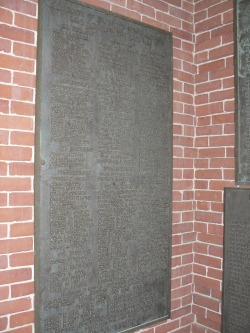
Of the 148 young men who went off to war in 1860 and 1861 (40% of the men of military age), 41 were killed in battle or died of disease - about 27%. Of the 107 survivors, at least 64 (60%) were messed up badly enough to apply for government pensions based on disabilities incurred during their time in duty.
If you were from Deerfield, you had a less than 30% chance of getting through the War unscathed.
As an American History teacher, it's tempting to say something like, "These are some pretty telling figures", but the truth is, they aren't. If you are 14 years old, numbers don't tell you much of anything.
That's my job.
I've got a great bunch of students this year. They are proud of their small town and are interested in doing something to help out their community, as long as it's authentic - they can smell a teacher-designed, pat-answer, fake assignment a mile away. Give them something real to do and they'll invest a fair amount of effort in it; patronize them and you'll find yourself wasting a fair amount of your own energy trying to engage them.
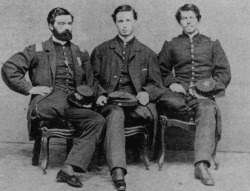
Isn't that GREAT!?
Unfortunately, I've never been able to come up with an actual project to go along with that title.
This past summer, I started batting a few ideas back and forth about a project I could do with my 8th graders that would make the Civil War a little less abstract to them. Several years ago, while working on another research project with my classes, I discovered a really cool resource:
Civil War veterans who were really put through the wringer in the War and who found themselves unable to earn a living were able to apply to the government for a pension. Like all government programs, the pension application process involved an enormous amount of paperwork. Veterans had to undergo physical examinations, submit proof of their military service and collect affidavits from doctors and community members who could verify that they were indeed unable to earn a living.
That pension paperwork is still on file with the National Archives and available for study.
My thought was that there must be some way to use these records to engage my students in real historical research.
Here is what I came up with:
| dd_lesson_plan.doc |
1) Finding the Names of Everyone Who Served in the Civil War
I'm not sure what it's like in other parts of the country, but every small town in New England has a monument somewhere with a list of all the soldiers who served or died in each war since the Revolution. In the case of Deerfield, this is a series of large bronze plaques in front of the Public Library.
Fortunately for me, at some point, somebody really did their homework and even sorted the names of Deerfield's Civil War Vets by Service and Regiment. I took several photographs of the Civil War plaque and transcribed it.
2) Finding the Service Records for Those Men
In 1895, a book was published with the military records of each New Hampshire serviceman who served in the Civil War with the catchy title of The Revised Register Of The Soldiers And Sailors Of New Hampshire In The War Of The Rebellion, 1861 - 1866. Large libraries in New Hampshire have copies of it, as well as the State Library in Concord and the New Hampshire Historical Society's library. A few years ago, while I was doing some other Civil War research, someone gave me a copy of this book on disk.
(I'd tell you who gave it to me, but I'm not 100% certain they were supposed to hand this sort of record out to just anybody - and if anyone fits the description of "just anybody", it's me.)
Anyway, I used the information in the R.R.o.t.S.&S.o.N.H.i.t.W.o.t.R to copy down the short version of the service record each of Deerfield's Civil War vets.
I eliminated all the soldiers who had been killed during the war and highlighted those who had been wounded - especially those who had been mustered out of service during the war for disabilities.
| residents_of_deerfield_new_hampshire_who_served_in_the_civil_war.doc |
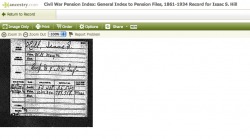
(See image on left.)
4) Fundraising
Each Pension Packet you order from the National Archives runs about 75 dollars. When I was putting this project together, I figured that I needed to buy seven packets. (I had a few packets already from the project I did several years ago.) I applied to our PTO and another parent group for money to buy the packets and the local historical society paid for an additional one.
(As it turns out, I wasn't able to prepare all the packets for use this year - see below - so I'll have a couple of years worth of new packets to work with over the next couple of years. If any documents over a hundred years old can be referred to as "new".)
5) Cherry-Picking Documents
Once the packets arrived, I begged some help from colleagues at school to help me look through each packet and pick ten to fifteen pages of primary source documents that give a good idea of each soldier's particular disability and any documents that cast doubt on his fitness for a pension. Some of these packets can run to upwards of 100 pages, so it was important to me to cherry-pick the best/most interesting/most disturbing of the records to present to my students.
And believe it - some of these pension applications are pretty disturbing.
No, actually that's not true. They're ALL disturbing. Here's a sample:
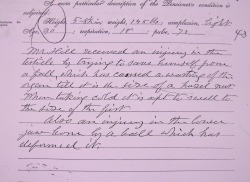
Another soldier had 40 years of chronic diarrhea so profound that he eventually suffered from a prolapsed rectum. (If you don't know what that is, trust me; you really don't want to.)
Yet another pension request was from the widow of a soldier who'd been a prisoner of war and had never recovered. What made this request so interesting is that the widow had apparently been something of a Good-Time Girl in her day and had a reputation that could be generously described as "checkered".
Another widow had watched her husband die of tuberculosis, followed by her two oldest children. She got to watch her family die off, one-by-one, then try to raise her remaining child on an eight-dollar-per-month pension which the government contested.
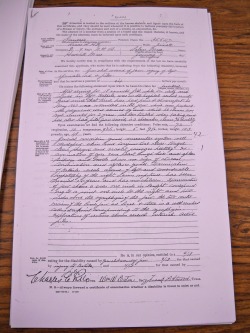
The records in the pension packets were at least 100 years old. They were mostly hand-written in cursive, often miss-spelled and used archaic legal and medical terms. It would be patently unfair to just hand them over to a bunch of 8th graders to try to make sense of. They had to be transcribed.
This was the most maddening, labor-intensive, time-consuming aspect of the whole project. I had anticipated being able to transcribe all the records I needed for all fifteen packets in a week or so. With a LOT of help, I got through eight of them in two months.
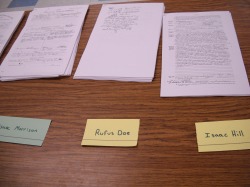
Now, finally, we're at a point where the students can get involved.
Each class was broken up into three-four person teams. Each team consists of:
- Two Advocates, who will be responsible for pleading the case for "their guy" to get his pension.
- A "Devil's Advocate" who will argue against it.
- Some teams will have a Biographer who will make up a timeline of the Army career of the soldier in question. The Biographers are Special Education students who need to work with more concrete-operational concepts.
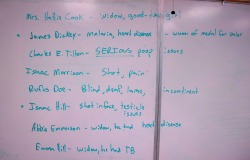
I used the document camera in my classroom to show a few pages from each of the packets and give the students an overview of each case. They talked among themselves and each team chose which soldier they wanted to research. No teams in the same class were allowed to choose the same soldier.
This was a spirited discussion.
9) The Project Itself (Finally!)
((Thank you for your patience...))
So here is what the students are going to do with these pension cases:
They will have a week to do research. Each student is responsible for finding at least four pieces of information from the Primary Source packet to support his or her argument that his or her soldier does (or in the case of the Devil's Advocate, does not) deserve to get a pension. He or she also needs to support this argument with research from an online source, an off-line source (which we quaintly refer to as "books") and by emailing an outside expert - in most cases, a doctor or historian that I have roped into helping us.
After one week, the teams will go in front of a Pension Board made up of actual community members - not parents, teachers or other "safe" people. Our Pension Board will be made up of our Superintendent, a School Board Member, the Commander of the local American Legion chapter and an attorney from the community. Each team will make the case for (and against) their veteran or widow getting a pension. The Pension Board will decide which of the veterans will actually get their pension. (Out of a class with five teams, only three pensions can be awarded.)
[Actually, only two of my four classes will make their arguments to this Pension Board. The other two classes will film their presentations for a Middle School class in Kansas, who will deliberate on their decision and notify us via a Skype teleconference a week later.]
Advocates on the teams whose soldier is awarded a pension will receive extra-credit bonus points. Devil's Advocates on the teams that are denied a pension will get bonuses. All presentations will be recorded and published as podcasts.
The beauty of this setup, (if it works) is three-fold:
1) Students can choose to work together or separately and can get information from any credible source. They can ask for my help and I can give it to them. It is almost impossible to "cheat" in a project like this, unless they blatantly copy from another student or fake their data.
2) They are doing actual historical research. They aren't playing the role of a "historian" assigned to them by a teacher; they are doing honest-to-God, real historical research with no guarantee of success. Because of that, I can give them lots of help and sincere advice, without falling back on teacherisms like: "I don't know, what do YOU think?..."
3) They are given a large degree of choice. They design their arguments and direct their own research. They can take this in any direction they choose.
As I write this, the students have been assigned "their guys". There was tremendous buy-in (at least so far - as the work gets harder, this project will surely grow "stupider", for at least some of the kids.) They have been coming up with some dynamite questions to email to their experts. Our brightest students, who aren't often challenged, are, for the most part taking the bit in their teeth and charging into this project.
We will spend a day or so in the library next week and another day or so in the classroom, hashing out last-minute details, before they meet with their respective Pension Boards, next Thursday and Friday.
On-The-Fly Modifications
Several of the students who had originally volunteered to be Devil's Advocates have decided that they aren't comfortable with that role. On further reflection, I realized that the D.A role wasn't strictly necessary - just cool - so I let several teams proceed without one.
I realized that if I just handed out a list of email addresses of experts for my students to contact, they would all email whoever was first on the list. At that point, I didn't have enough brain cells left to assign experts to individual teams, so I printed up the names and email addresses of each expert on colored slips of paper (blue for doctors, green for historians) and put them into the Awesome Jar of Destiny. When students are ready to contact their experts, I have them tell me the question they will ask, then have them draw a random blue or green slip from the A.J.o.D.
Concerns
I know that several of my students will procrastinate and won't be ready to present to their Pension Board next week. This is unfortunate. This will be a valuable lesson in the sad truth that sometimes deadlines can't be extended.
These guys haven't had a lot of experience in doing higher-level reasoning in research papers, heretofore. Their usual method of research is to look up any vaguely-related information and find a theme there. In this case, they have to come up with questions in order to take their research in a direction. This is proving difficult with some of them. Again, it may be a painful lesson, but one that I think they are ready for.
I have high hopes for this project and I will update this post in a week or two, when it is completed, to let you know how everything goes. My fingers are crossed.
Update #1
My first two blocks met with their Pension Panel yesterday morning.
THEY DID AWESOMELY!!!
Out of 35 students or so, only one or two seemed a little lack-luster or lost. The rest got in there and advocated the CRAP out of their cases! If I could only pick three highlights:
1) Student who is normally very concrete-operational and doesn't get subtleties very easily, under cross-examination from the Pension Panelists, effortlessly and flawlessly distinguished between what she knew and what she assumed.
2) Another student, who has been out sick for the past week dragged herself back in to school. Made her argument - she had looked up and found the actual regulation from 1890 governing the criteria for awarding disability pensions to Civil War veterans. She enumerated how "her guy" met every one of the criteria and demanded that he get his pension. When her team's Devil's Advocate argued that he shouldn't get the pension, she turned back to a point-by-point dissertation on the official pension criteria. She was launching into it for a third time when everyone at the table surrendered and collapsed under the weight of her iron will. She has a great future ahead in... something...
3) Shy/Depressed Girl (who we've been frankly a little worried about lately) came to the table with a feral gleam in her eye. She was her team's Devil's Advocate. "Her guy" was 83 years old, blind, deaf, incontinent and crippled by having been shot in the elbow and left eye during the war. She attacked him like a pitbull who'd gone to law school. By the time she was done, even I was asking myself if this guy really deserved a pension. Early on in the process, she had asked me if she could ask questions of her own expert instead of one of the ones I had arranged ahead of time. I'd said yes and it turns out she'd consulted a lawyer.
One of our Pension Panelists was our superintendent, who was very impressed. He kept looking over at me during the presentations, as if to ask how much of this I'd done for the students and I just kept having to shake my head to say - "almost none of it".
I can't tell you how well this went and how proud I am of these guys. You know how no project ever goes quite the way you want it to the first time you do it and you're left with a laundry list of tweaks and changes you want to make the next time around, as well as the vague question hanging in the air of whether you should try it again?
Not this time, Baby!!
My other two blocks will be filming their arguments today to upload to their peers in Kansas. I'll update on how they do later, but short of their burning my classroom down or beating up penguins or something, I'm going to have to declare this project a success already.
More updates later.
[Note - the steps I took to put this project together work really well in New Hampshire. I'm not sure what resources are available to teachers in other states and I have NO idea what is available in countries other than the United States. If you'd like to try something like this and contact me, I'll be happy to help you brainstorm resources.]
 RSS Feed
RSS Feed